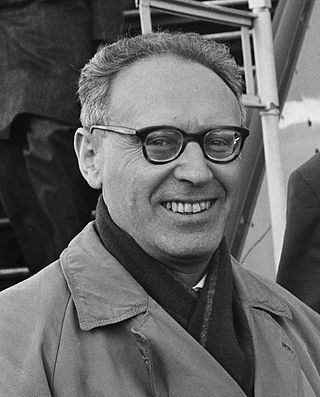
Mikhail Moiseyevich Botvinnik was a Soviet and Russian chess grandmaster who held five world titles in three different reigns. The sixth World Chess Champion, he also worked as an electrical engineer and computer scientist and was a pioneer in computer chess. He also had a mathematics degree (honorary).

Alexander Alexandrovich Kotov (Алекса́ндр Алекса́ндрович Ко́тов; was a Soviet chess grandmaster and author. He was a Soviet chess champion, a two-time world title Candidate, and a prolific writer on the subject of chess. Kotov served in high posts in the Soviet Chess Federation, and wrote most of his books during the Cold War. The importance and breadth of Kotov's work rank him among the all-time greats in this field.

Reuben C. Fine was an American chess player, psychologist, university professor, and author of many books on both chess and psychology. He was one of the strongest chess players in the world from the mid-1930s until his retirement from chess in 1951. He was granted the title of International Grandmaster by FIDE in 1950, when titles were introduced.
Vladimirs Petrovs was a Latvian Russian chess player.
Alexander Kazimirovich Tolush was a Soviet chess grandmaster. He was one of Boris Spassky's mentors. Tolush was born and died in Saint Petersburg. He earned the title of International Master (IM) in 1950, Grandmaster (GM) in 1953, and International Master of Correspondence Chess (IMC) in 1965.
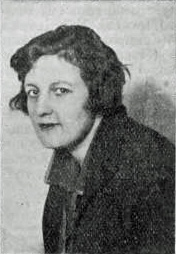
Lyudmila Vladimirovna Rudenko was a Soviet chess player and the second women's world chess champion, from 1950 until 1953.
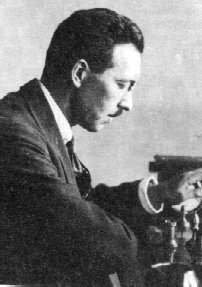
Grigory Yakovlevich Levenfish was a Soviet chess player who scored his peak competitive results in the 1920s and 1930s. He was twice Soviet champion, in 1934 and 1937. In 1937 he drew a match against future world champion Mikhail Botvinnik. In 1950 Levenfish was among the first recipients of the title of Grandmaster, awarded by FIDE that year for the first time.

Igor Zakharovich Bondarevsky was a Soviet Russian chess player, trainer, and chess author. He held the title of Grandmaster in both over-the-board and correspondence chess. Bondarevsky shared the 1940 Soviet title, and later coached World Champion Boris Spassky.

Fedir Parfenovych Bohatyrchuk was a Ukrainian–Canadian chess player, doctor of medicine (radiologist), political activist, and writer.

Alexander Markovich Konstantinopolsky was a Soviet chess player, trainer and writer. He was a five-time champion of Kiev, and trained the world title challenger David Bronstein from a young age. He was awarded the title of International Master (IM) by FIDE in 1950, won the first Soviet Correspondence Chess Championship in 1951, earned the IM title at correspondence in 1966, and earned the title of Honorary Grandmaster in 1983.
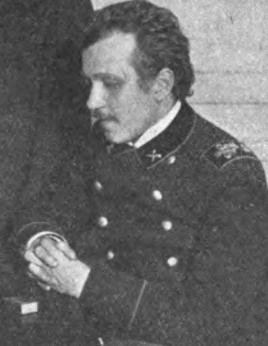
Sergey von Freymann (1882–1946) was a Russian-Uzbekistani chess master.

Boris Markovich Verlinsky was a Soviet chess player, who was awarded the title International Master by FIDE, the world chess federation, in 1950. He was one of the top Soviet players in the 1920s, and was Soviet champion in 1929.

Pyotr Arsenyevich Romanovsky was a Russian and Soviet chess player and author. He won the Soviet Championship in 1923 and, jointly, 1927.

Ilya Leontievich Rabinovich was a Russian and later Soviet chess player, among the best in his country for three decades, from 1910 to 1940. His best result was a shared first place in the 9th Soviet Championship of 1934-35. He was also a chess writer.
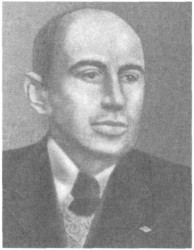
Ilya Abramovich Kan was a Soviet chess player. He was awarded the title of International Master (IM) by FIDE in 1950.
Vsevolod Alfredovich Rauzer, also spelled Wsewolod Rauser was a Soviet Ukrainian chess master known for his great contributions to chess opening theory, especially of the Sicilian Defence.
Vladimir Alexeyevich Alatortsev was a Soviet chess player, author, and administrator. During his career, he became champion of both Leningrad and Moscow, and played in the Soviet Chess Championship finals nine times, with his best competitive results in the 1930s. He placed clear second in the 1933 Soviet final. He retired from most competitive play in the early 1950s, moving into roles as a chess organizer, teacher, and coach. He served as chairman of the All-Union chess section from 1954 to 1959 and as chairman of the USSR Chess Federation from 1959 to 1961. By profession, he was a hydraulics engineer.

Arvid Kubbel was a chess player and composer of chess problems and endgame studies from the Soviet Union. He was a brother of Evgeny and Leonid Kubbel ; their father was born in Latvia, of Baltic German descent. He played in relatively few tournaments, but was among the stronger players of the early Soviet Union.

Georgy Mikhailovich Lisitsin or Lisitsyn was a Russian chess master from Leningrad. After high school he entered the Leningrad Industrial Institute, from which he graduated as a mechanical engineer.

The 1934/1935 USSR Chess Championship was the 9th edition of USSR Chess Championship. Held from 7 December 1934 to 2 January 1935 in Leningrad. The tournament was won by Grigory Levenfish and Ilya Rabinovich. Mikhail Botvinnik did not participate because on the same date he was abroad playing the Hastings Tournament.














